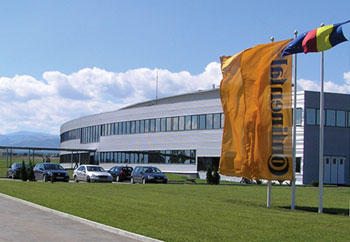Location, Infrastructure Boost Dutch Logistics
added logistics center, handling labeling, packaging and distribution of products directly to some 10,000 European customers. It distributes products including Neupogen, which reduces chemotherapy side effects.
Van der Aar says Amgen chose Breda for its proximity to ports in Rotterdam and Antwerp.
Amgen is one of many companies that have selected the Netherlands as a logistics hub for its key location in serving European markets. In fact, the country is home to 51 percent of North American companies' European distribution centers. One of the latest is Pratt & Whitney Canada, which opened a new parts distribution center in Amsterdam in November 2006 to provide rapid parts deliveries for its engine customers in Europe, the Middle East and Africa.
The country's two key ports, in Rotterdam and Amsterdam, and Schipol Airport provide key transportation infrastructure. Both ports logged record years in 2006. Adding to the country's logistics infrastructure is the opening of the Betuweroute, a 100- mile (160- km.) freight- only railway running from the Port of Rotterdam to the German border. The US$6.1 billion (4.7- billion euro) line is set for completion in 2007. The route includes five tunnels and 130 viaducts and bridges. The Betuweroute will be part of the Trans European Network's Trans European Freight Rail Network.
 |
Continental Expands in Romania
Automotive supplier Continental AG expects to complete the addition of a new production area at its Sibiu, Romania, plant in May. The expansion will double the production area to 58,200 sq. ft. (5,400 sq. m.). The plant is part of Continental's Automotive Systems Division. The new production line will produce transmission control units for the company's Powertrain & Chassis business unit. |
Bridgestone Opens Second Plant in Brazil
apanese tire specialist Bridgestone Firestone has officially opened its second Brazilian facility. The US$160- million facility is in the State of Bahia and is to be operated by the company's Bridgestone Firestone do Brasil Indústria e Comércio Ltda. subsidiary. The plant will eventually employ 500 as it ramps up daily production to 8,000 tires.
"The construction of this plant in Bahia is proof of Bridgestone Americas' commitment to Brazil," said Mark A. Emkes, chairman and CEO of Bridgestone Americas Holding, Inc., parent company of Bridgestone Firestone Brazil. "Tires with a sophisticated design and innovative technology will be shipped from the Bahia plant to meet worldwide consumers' needs as well as those of local consumers."
By the end of 2007, Bridgestone Firestone Brazil will have concluded a seven- year plan of investments in Brazil totaling $460 million, which includes building the new plant and modernizing production at its Santo André facility.
Higher Value Operations Enter Emerging Markets
s the role emerging markets play in the world economy evolves, many companies report they are having difficulty meeting their operations or revenue goals in these countries. That's a finding of Deloitte's Global Manufacturing Group's 2007 annual survey of emerging markets. The "Innovation in Emerging Markets" report, to be published in March, suggests that increasing business complexities and the difficulty of managing emerging market operations are among the reasons.
Executives surveyed in the study say they are developing innovative products that meet the needs of new and growing markets and, as a result, are moving higher- value activities such as complex production, R&D, and sales operations into emerging markets. The Deloitte study indicates that 81 percent of executives said their companies are likely to establish or expand sales and distribution operations in Eastern Europe over the next five years; 80 percent said the same for Latin America and 73 percent said the same for India.
Companies historically have opted to locate in emerging markets to take advantage of low- cost labor. As they shift more sophisticated activities to these markets, they are finding a much smaller pool of highly skilled workers to staff these operations. Labor costs and turnover are increasing as a result, making retention increasingly difficult.
Customization of human resource policies to local realities may be a way to win the talent war, says Deloitte. In China and India, for example, training was cited as an important human resources strategy even more often than compensations. In Southeast Asia, rewards and recognition were named most often.
Deloitte says some companies use the operating model of providing autonomy at the local level to gain local knowledge and respond quickly to opportunities while leveraging the strengths provided by headquarters, such as good governance and management expertise.
TOP OF PAGE
|


